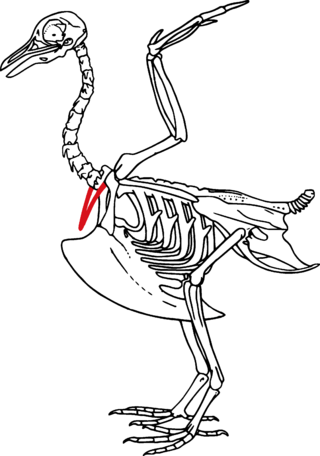
The furcula or wishbone is a forked bone found in most birds and some species of non-avian dinosaurs, and is formed by the fusion of the two clavicles. In birds, its primary function is in the strengthening of the thoracic skeleton to withstand the rigors of flight.

Notodontidae is a family of moths with approximately 3,800 known species. The family was described by James Francis Stephens in 1829. Moths of this family are found in all parts of the world, but they are most concentrated in tropical areas, especially in the New World.
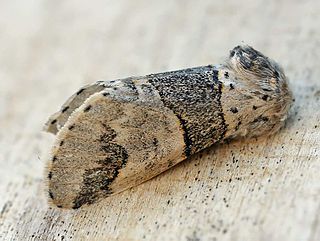
The poplar kitten is a species of moth in the family Notodontidae. The species was first described by Nikolaus Joseph Brahm in 1787. They are found throughout Europe and in North Africa, Mongolia, Kazakhstan and Xinjiang.

The eastern red bat is a species of microbat in the family Vespertilionidae. Eastern red bats are widespread across eastern North America, with additional records in Bermuda.

Furcula furcula, the sallow kitten, is a moth from the family Notodontidae. It was first described by the Swedish entomologist Carl Alexander Clerck in 1759 from a specimen found in Sweden.

Phragmatobia fuliginosa, the ruby tiger, is a moth of the family Erebidae.
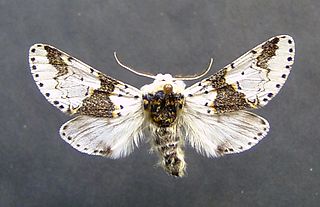
Furcula bicuspis, the alder kitten, is a moth of the family Notodontidae. The species was first described by Moritz Balthasar Borkhausen in 1790. It is found in most of the Palearctic realm.
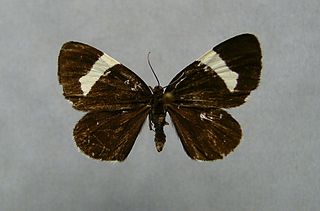
Baptria is a monotypic moth genus in the family Geometridae erected by Jacob Hübner in 1825. Its only species, Baptria tibiale, was first described by Eugenius Johann Christoph Esper in 1791. It is found in central and northern Europe.

Furcula is a genus of moths of the family Notodontidae. The genus was described by Jean-Baptiste Lamarck in 1816.

Furcula occidentalis, the western furcula moth, double-lined furcula or willow kitten , is a moth of the family Notodontidae. It is found from southern Yukon and British Columbia to Nova Scotia, south to Maryland and west to Utah and Oregon.

Furcula cinerea, the gray furcula moth, is a species of moth in the family Notodontidae. It was first described by Francis Walker in 1865. It is found in the United States, southern Canada and the Northwest Territories.

Eupithecia borealis is a moth in the family Geometridae first described by George Duryea Hulst in 1898. It is found in North America, including Alberta, Arizona, British Columbia, California, Colorado, Manitoba, Michigan, Montana, New Brunswick, New Mexico, New York, Newfoundland and Labrador, Nova Scotia, Ontario, Quebec, Utah and Wyoming.
Archepandemis borealis is a species of moth of the family Tortricidae. It is found in North America, where it has been recorded from Ontario and Maine.
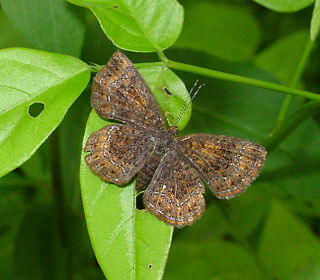
Calephelis borealis, commonly known as the northern metalmark, is a butterfly of the family Riodinidae. It ranges through western Connecticut south through west-central Pennsylvania; central Appalachians and Ohio River Valley. Isolated populations are also found in southwest Missouri and eastern Oklahoma. The habitat consists of open woodland streams near serpentine, shale or limestone barrens.
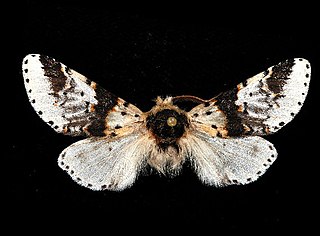
Furcula scolopendrina, the zigzag furcula moth or poplar kitten moth, is a species of prominent moth in the family Notodontidae. It was described by Jean Baptiste Boisduval in 1869 and is found in North America.
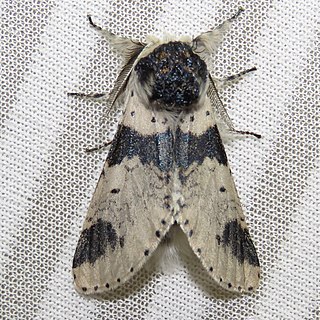
Furcula modesta, the modest furcula or modest kitten, is a species of moth in the family Notodontidae. It was first described by Hudson in 1891 and it is found in North America.
Furcula nivea is a moth in the family Notodontidae. It was first described by Berthold Neumoegen in 1891 and it is found in North America.














